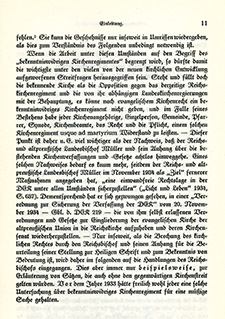In the Confessing Church’s Service
Gauger started working for the First Provisional Church Government in January of 1935 and was soon as jurist in a senior position. He wrote opinions and counseled detained pastors and their attorneys.
Following the Confessing Church’s split in February of 1936, Gauger became the senior jurist in the secretariat of the Council of the Evangelical Church in Germany (the Luther Council) without having a secure job, however: Although the decision to hire him had been made on March 18, 1936, it has still not been implemented formally in early 1937. Thomas Breit (1880–1966), a member of the Bavarian High Consistory, thus intervened once again on Gauger’s behalf.
Unlike other staff members, Gauger had not been delegated by a regional church and the regional church was not supposed to contribute to his pay. The Luther Council was supposed to take over his salary instead. Since it was unable to act as an employer however, the Bavarian Regional Church hired Gauger as a legal assistant on a long-term basis on June 17, 1938 and delegated him to work for the Luther Council.
In terms of Church policy, Gauger was initially willing to compromise and work together with the church committees constituted by the Reich Minister of Church Affairs, provided only the German Christians would be combatted. In June of 1938, he concluded that every attempt to reach an understanding with the state had failed, as if one were as illegal as the Dahlemites, and he expected he would be arrested.
In June of 1940, August Marahrens (1875–1950), Bishop of the Hannover Regional Church, intended to sign Reich Minister of Church Affairs Kerrl’s (1887–1941) five precepts of the church, state and race. Gauger attempted to prevent this since the Luther Council would lose its justification for existence, otherwise. Together with other members of the secretariat staff, he submitted his resignation out of protest, which Bishop Hans Meiser (1881–1956) refused to accept, however.
Gauger clearly revealed his attitude toward the state’s policy toward the church in both his dissertation – the printed edition of which was banned by Gestapo– and his entries in the “Calwer Kirchenlexikon”. His articles on church law and constitution contained clear references to the current Church struggle. For Gauger, there could only be church law in relationship to the Confession Writings; he rejected any Führerprinzip or leadership principle in the Church.
In the Festschrift for his father published in 1936, he dealt with the Nazi’s repressive press policy and astutely stressed that, as part of the preaching the Gospel, the Church press has to serve the truth (Notizen, 53). In posthumously printed articles about self-defense, he asserted that review of the legality of authorities’ exercise of their offices is desired by the executive as a defense for the völkisch community against its own government institutions! (385).
His work for the Confessing Church inevitably led to conflicts with government and party authorities. Gauger was interrogated in July of 1938 on account of a circular from the Luther Council. He took on the authorities once again when, a printer, which also printed “Licht und Leben”, was to be closed down in August of 1938.
Gauger nonetheless let various opportunities to leave Germany slip – a call to Madras Christian College in 1938 or the Red Cross in Geneva in 1939. He was always only capable of imagining a livelihood in Germany.
Source / title
- © Quoted from: Gauger, Martin: Beziehungen zwischen Bekenntnis und Kirchenregiment. Diss. Iur. Münster 1935, p. 11

